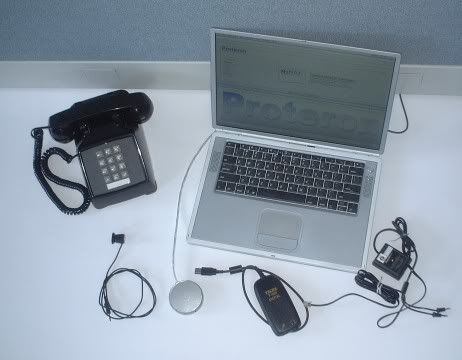
Telephone tapping (or wire tapping/wiretapping in the US) is the monitoring of telephone and Internet conversations by a third party, often by covert means. The telephone tap or wire tap received its names because historically, the monitoring connection was applied to the wires of the telephone line of the person who was being monitored and drew off or tapped a small amount of the electrical signal carrying the conversation. Legalized wiretapping by police or other recognized governmental authority is otherwise known as lawful interception.
http://en.wikipedia.org/wiki/Telephone_tapping
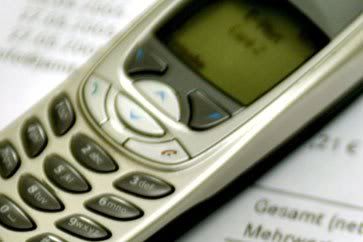
Phone Taps / Telephone Wiretapping
http://www.tscmvideo.com/Articles%20and%20Reports/phone-tap-wiretap.html
Telephone tapping or wire tapping/ wiretapping (in US) is the monitoring of telephone conversations by a third party, often by covert means. The telephone tap or wire tap received its name because, historically, the monitoring connection was applied to the wires of the telephone line of the person who was being monitored and drew off or tapped a small amount of the electrical signal carrying the conversation.
Wiretapping Legal status
Telephone wiretapping is officially strictly controlled in many countries to safeguard an individuals Privacy; this is the case in all developed democracies. In theory, telephone wiretapping often needs to be authorized by a court, and is, again in theory, normally only approved when evidence shows it is not possible to detect criminal or subversive activity in less intrusive ways; often the law and regulations require that the crime investigated must be at least of a certain severity. In many jurisdictions however, permission for telephone wiretapping is easily obtained on a routine basis without further investigation by the court or other entity granting such permission. Illegal or unauthorized telephone wiretapping is often a criminal offence. However, in certain jurisdictions such as Germany, courts will accept illegally recorded phone calls without the other party's consent as evidence.
In the United States, federal agencies may be authorized to engage in wiretaps by the United States Foreign Intelligence Surveillance Court, a court with secret proceedings, in certain circumstances.
Under United States federal law and most state laws there is nothing illegal about one of the parties to a telephone call recording the conversation, or giving permission for calls to be recorded or permitting their telephone line to be tapped. However, several states (i.e., California, Connecticut, Florida, Illinois, Maryland, Massachusetts, Michigan, Montana, Nevada, New Hampshire, Pennsylvania and Washington) require that all parties consent when one party wants to record a telephone conversation.
Many businesses and other organization record their telephone calls so that they can prove what was said, train their staff, or monitor performance. This activity may not be considered telephone tapping in some, but not all, jurisdictions because it is done with the knowledge of at least one of the parties to the telephone conversation. It is considered better practice to announce at the beginning of a call that the conversation is being recorded.
Wiretapping methods
The official tapping of telephone lines
The contracts or licenses by which the state controls telephone companies often require that the companies must provide access for wiretapping lines to the security services and the police. In the U.S., telecommunications carriers are required by law to cooperate in the interception of communications for law enforcement purposes under the terms of CALEA. Taps must be secret and undetectable.
When telephone exchanges were mechanical, a wire tap had to be installed by technicians, linking circuits together to route the audio signal from the call. Now that many exchanges have been converted to digital technology tapping is far simpler and can be ordered remotely by computer. Telephone services provided by cable TV companies also uses digital switching technology. If the wire tap is implemented at a digital switch, the switching computer simply copies the digitized bits that represent the phone conversation to a second line and it is impossible to tell if your line is being wiretapped or not. Even a well designed wire tap installed on a phone wire can be difficult to detect. The noises that some people believe to be telephone wire taps are simply crosstalk created by the coupling of signals from other phone lines.
Data on the calling and called number, time of call and duration, will generally be collected automatically on all calls and stored for later use by the billing department of your phone company. This data can be accessed by security services, often with fewer legal restrictions than for a wire tap. This information used to be collected using special equipment known as pen registers and trap and trace devices and U.S. law still refers to it under those names. Today, a list of all calls to a specific number can be obtained by sorting billing records. A telephone wire tap during which only the call information is recorded but not the contents of the phone calls themselves, is called a Pen Register tap.
For telephone services via digital exchanges, the information collected may additionally include a log of the type of communications media being used (some services treat data and voice communications differently to conserve bandwidth).
The unofficial tapping of telephone lines
It's also possible to wire tap conversations unofficially. There are a number of ways to monitor telephone conversations:
Recording the conversation - the person making/receiving the call records the conversation using a coil tap ('telephone pickup coil') attached to the ear-piece, or they fit an in-line tap with a recording output. Both of these are easily available through electrical shops. Most who record telephone conversations, such as journalists, will use the recording for their own private work. But be aware that anything you say to someone you don't know may be recorded and used for other purposes.
Direct line wire tap - this is what the state used to do via the telephone exchange. But unofficial wiretapping, where the user's line is physically wiretapped near the house, is also possible. The wire tap can either involve a direct electrical connection to the line, or an induction coil. An induction coil is usually placed underneath the base of a telephone or on the back of a telephone handset to pick up the signal inductively. With a direct connection, there will be some drop in signal levels because of the loss of power from the line, and it may also generate noise on the line. An induction tap doesn't drain voltage or current from the line because it isn't physically connected to the phone line.
Direct wire taps sometimes require regular maintenance, either to change tapes or replace batteries, which may give away their presence.
Radio wiretap - this is like a bug that fits on the telephone line. The state does not normally do this because they have access via the telephone exchange, though certain organizations exempt from the common framework of law that applies to citizens may use devices like this. It can be fitted to one phone inside the house, or outside on the phone line. It may produce noise (you might even get signal feedback down the line on amateur made equipment) to alert you, but probably not as modern state of the art equipment operates in the 30-300 GHz range. The unit is powered from the line so once installed it's maintenance free, and only transmits when there is a call in progress. These wiretapdevices tend to be low powered because the drain on the line would become too great, however a state of the art receiver could be located as far away as ten kilometers under ideal conditions, but is usually located within a radius of 1 to 3 km. Research however has also shown that a satellite can be used to pickup emissions in the range of a few milliwatts.
To guard against unofficial amateur line wiretaps you should regularly inspect your phone itself, and your telephone line for new joints, or small wires connected to the line; a time-domain reflectometer is a worthy tool here. If you have reason to suspect your phone has been tapped consult a technical surveillance countermeasures (TSCM) specialist. Never contact a TSCM specialist from a phone you suspect is wiretapped or on any other phone on the premises or any other phone that is linked to you or your organization (home phone, company cellular etc.)
How can I tell if my phone is being tapped?
http://www.computer-forensic-technician.com/wordpress/how-can-i-tell-if-my-phone-is-being-tapped/
Is Your Cell Phone Bugged?
Wiretapping/Eavesdropping on Telephone Conversations:
Is There Cause for Concern?
http://www.privacyrights.org/fs/fs9-wrtp.htm
Types of Wiretaps, Bugs and Methods
http://www.tscm.com/typebug.html
How Wiretapping Works
http://www.howstuffworks.com/wiretapping.htm
Eavesdropping History
http://www.spybusters.com/History_Eavesdropping.html
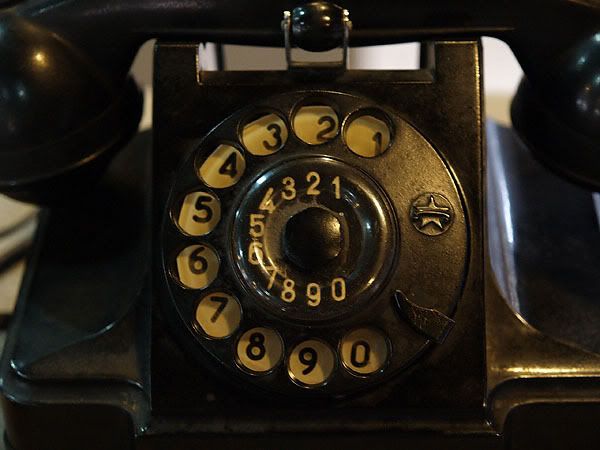
TAPPING THE WIRES
http://www.spybusters.com/History_1938_Tapping_Wires.html
Wire-tapping got its start in New York in 1895, when a former telephone worker who had joined the city police suggested that it might be a good idea to listen in on wires used by criminals. William L. Strong, who was Mayor at the time, gave the project his blessing and for years after that wire-tapping flourished secretly. It was something the public of that period wouldn’t worry about, anyhow, because in the nineties the telephone was not generally regarded as a household fixture.
In those days police wire-tappers just walked into the Telephone Company’s offices, asked for the location of the wires they were interested in, and got the information without fuss. Lines were usually tapped right in the cellar of the house or at an outside wall box.
There was an uproar when people got wind of the prevalence of wire-tapping. An investigation of public utilities in 1916 called attention to it. Those, of course, were war days and eavesdropping of all kinds was widely encouraged. The government was tapping thousands of lines. A complete central-office switchboard had been set up in the New York Custom House, with taps running into it from all parts of the city. Every time a suspected alien lifted his receiver a light showed on this board and a stenographer, with headset clamped on, took a record of the conversation.
Inevitably it was claimed that wire-tapping violated a citizen’s rights, and a large section of the press cried out against the practice, but nothing ever came of it. The furor, however, made the wire-tapper’s job more difficult, because the Telephone Company, finding itself in an uncomfortable position, refused from then on to cooperate with the police in helping them locate suspect wires. Drawing itself up to its corporate height, it assumed a haughty manner toward detectives and since that time the company officially has refused to assist in tapping. To make matters worse, the wiring system grew more and more complicated. Today there are nearly 1,700,000 telephones in the city, and even an experienced wire-tapper would be unable to find a particular circuit if he did not know the right people in strategic telephone posts.
That is why most police wire-tappers, following the precedent of the man who introduced the science in the department, are former employees of the Telephone Company. They have not only the background of an inside view of the system, but friends in the organization upon whom they count for surreptitious assistance. Moreover, an experienced wire-tapper who is familiar with the trade terms used by Telephone Company workers is able to pose convincingly as an employee when he wants to learn the location of a particular set of wires.
If the special operator who handles test calls is suspicious and asks “Who’s your foreman?” or “What’s your order number?” the expert tapper is ready with the answers picked up from his cronies in the company. With the necessary information he can go out, find the circuit, make his tap, run his extension wires to an empty flat or office, and prepare to listen.
Wire-tappers are seldom caught at their work. They know they must remove their listening equipment if they hear a telephone subscriber complain to the operator that “something is wrong with the wire.” When it is discovered that a line has been tapped, the company for the next five days makes regular inspections of that particular circuit. Detectives are aware of this routine, and when the five-day period has expired, hook right in again.
It’s pretty hard to detect a wire-tapper by the sound of your telephone. Foreign noises on the line are more apt to be caused by worn-off insulation, dampness in the cables, or some other natural disarrangement. A good wire-tapper is rarely guilty of creating “swing,” which is the professional term for the crackling noise sent over a telephone circuit by a faulty tap. Wherever possible, he fastens the wires of his instrument to nut-and-washer connections found in panel boxes, the terminals from which extension lines are run. Such connections are practically swing-proof. If circumstances compel him to resort to a “raw” tap, for which he must cut in somewhere in the middle of the line, he uses improved clips with central piercing needles to make a tight connection with the wire.
As a rule, though, wire-tappers are pretty grave fellows. They spend a lot of their own time and money fussing with new listening appliances or trying to improve old ones. Most of them rig up experimental stations in their homes. They shop busily in Canal Street stores which deal in second-hand electrical equipment, buying apparatus discarded by the telephone and telegraph companies. Out of these experiments, in 1930, came the dial-detector, an indispensable instrument for tapping wires in a city where few numbers are now called orally. Once it was easy for cops to ascertain the whereabouts of both parties in an outgoing phone conversation: they knew where the tapped wire led and they could hear the number called by the suspect. But when dials were installed they could not check on the destination of a call. Just when the new instruments were threatening to put a serious crimp in the tappers’ usefulness, a detective who had been a Telephone Company mechanic came to the rescue of the craft. His dial-detector, which he made out of second-hand telegraph parts, records as a series of dots on a thin paper tape, the clicks you hear when you dial. The tapper can read the number called from these symbols.
In most cases the old-school wiretappers prefer their homemade equipment. They find they can duplicate the store sets without much trouble and at considerable saving. This is true even of the newest contraption, an especially powerful induction coil which resembles a five-inch firecracker. It is a magnet wrapped in eight thousand turns of very fine wire — a sinister contrivance that inhales a telephone conversation without being connected to the circuit, the coil merely being placed near the wires leading to the telephone under observation. It will pick up sounds through an eighteen-inch wall.
Police tappers resent newcomers in the business, and are especially bitter toward the graduates of the Treasury Department wire-tapping schools. Few if any of these young men have served apprenticeships with the Telephone Company, which the police eavesdroppers regard as the only worthwhile alma mater.
The police complain that the Treasury Department rookies aren’t taught how to work with telephone linesmen and operators. As a result, they say the youngsters are always committing blunders which make it just that much harder for the old-timers to get cooperation from telephone men.
The Treasury Department headmasters seldom educate their charges in the technical details of wire-tapping. Pupils in the kindergartens – as the self-made tappers call the federal schools — are drilled primarily to avoid detection once they have settled themselves at a listening post. They are warned to take their clips off lines when they hear peculiar noises which might mean that the company’s wire chief is testing, but never to meddle otherwise with the apparatus, because it is set up for them by older men. This makes a New York detective smile wryly; he always does his own hooking up. The courses in Washington also offer such simple advice as “Don’t let strangers into the listening post,” “If a janitor or some building official must enter the post, cover the equipment with clothing or a newspaper,” “Never leave any notes or reports behind you when you leave your post.”
City tappers agree with federal men, however, on one point. Both consider the practice exclusively a government privilege and look upon wire-tapping by private detectives as something illegal and unethical. The private agencies usually get radio men to help them in their telephonic skulduggery. These tappers have one trick, a modification of the wooden horse of Troy that they use frequently in helping clients who are suspicious of their wives or paramours. The agency tells the man to get his lady a radio; if she already has one they tell him to get her a better set. When the apparatus is delivered it contains a hidden microphone that will pick up a whisper at the far end of a large room. The listening wire is spliced to the aerial led-in wire which runs to the roof. After that, listening is easy.
The first private detective agency to use wire-tapping was the William J. Burns outfit. Early in the World War period they cut in on the wires of a law firm in the Equitable Building, at 120 Broadway, trying to find out whether one of J.P. Morgan’s clerks was relaying through it secrets about the Allies’ munitions orders. Another agency, a bitter competitor of Burns, learned about the tap and warned the victims out of spite. The information came a bit late. The tappers, suspecting they might be caught, had departed.
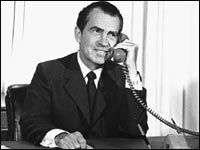
Timeline: Wiretaps' Use and Abuse
http://www.npr.org/templates/story/story.php?storyId=5061834
Wiretapping is as old as the telephone itself. Yet the laws to prevent its misuse are even older.
That said, revelations that President George W. Bush authorized wiretaps without prior court approval have reopened a century-old debate over when electronic surveillance is allowable under the law.
The following timeline shows how wiretapping and other forms of electronic surveillance have come under increasing restriction after decades of abuse.
1791: Fourth Amendment Limits Searches and Seizures
The amendment guarantees "the right of the people to be secure in their persons, houses, papers, and effects, against unreasonable searches and seizures." It stems from American colonists' anger over the British government's so-called "writs of assistance," which gave its customs officers broad rights to search colonists' homes, mostly in pursuit of smuggled goods. But the Fourth Amendment's roots go further back -- all the way to the British maxim that "a man's home is his castle."
1844 – 1876: Telegraph System and Telephone Invented … Wiretapping, Too
With the message "What hath God wrought?" the telegraph machine dramatically speeds communication across long distances. The nation's telegraph system arises in 1844. The invention of the telephone follows in 1876. But since both mechanisms require multiple operators to relay messages and patch calls through, there is no way to guarantee privacy.
1888: "Strowger Selector" Cuts Out Phone Operators
The first automatic telephone switching system, the "Strowger Selector" is invented by a funeral parlor owner angry because a competitor's wife -- who worked as a telephone operator -- was allegedly transferring calls for Strowger's mortuary to her husband's business. While the "Strowger Selector" cuts the operator out of the connection, it can't stop others from listening in by tapping into the line.
1934: Congress Passes Federal Communications Act
The first law to address the use of wiretapping, it states that "no person not being authorized by the sender shall intercept any communication and divulge or publish the existence, contents, substance, purport, effect, or meaning of such intercepted communications to any person …" The law, however, doesn't outlaw wiretapping, only the disclosure of information gathered during a wiretap. That allows government spies not only to continue the use of wiretaps, but to increase the practice.
1968: Senate Wowed by 'Bug in the Martini Olive' Trick
Seeking to show the national security advantages of concealed recording technology, private investigator Hal Lipset installs a transmitter inside a fake olive, showing an amazed Senate Subcommittee the power of listening devices. (Lipset later becomes the inspiration for Harry Caul, the bugging-obsessed character Gene Hackman played in the 1974 movie The Conversation.)
1967: Supreme Court Weighs in on Wiretapping
In Katz v. United States, a case involving a man convicted of transmitting gambling information on a payphone, the Supreme Court rules that the Constitution guarantees that "wherever a man may be, he is entitled to know that he will remain free from unreasonable searches and seizures. No less than an individual in a business office, in a friend's apartment, or in a taxicab, a person in a telephone booth may rely upon the protection of the Fourth Amendment." Still, the court allows for an exception in cases "involving the national security," noting that President Lyndon Johnson's administration has claimed a special right in such instances to conduct wiretaps without a warrant.
1968: Congress Limits Wiretapping
Inspired, in part, by Hal Lipset's unsettling demonstrations, Congress passes the Omnibus Crime Control and Safe Streets Act, the first federal law to restrict wiretapping: "To safeguard the privacy of innocent persons, the interception of wire or oral communications where none of the parties to the communication has consented to the interception should be allowed only when authorized by a court of competent jurisdiction and should remain under the control and supervision of the authorizing court." The law notes, however, the president's constitutional power to authorize such wiretaps "to protect the United States against the overthrow of the Government by force or other unlawful means, or against any other clear and present danger to the structure or existence of the Government."
1974: Plug Pulled on Nixon and his Plumbers
The House Judiciary Committee issues articles of impeachment against Richard M. Nixon, in part, for his role in authorizing wiretaps on 17 individuals, in a conspiracy to influence the outcome of the 1972 presidential election.
1975: Congress Gets an Earful at Church Hearings
Headed by Sen. Frank Church, a Senate committee looking into CIA and FBI intelligence operations hears a laundry list of abuses, including hundreds of warrantless wiretaps placed on antiwar and civil-rights leaders, such as Martin Luther King, Jr., as well as electronic surveillance of labor union leaders, student groups, newsmen and even former White House staffers and a U.S. Congressman.
1978: Foreign Intelligence Surveillance Act Passes
Spurred by the abuses reported by the Church Committee, Congress passes new, more stringent restrictions on wiretapping, creating a legal review process to ensure wiretaps are focused narrowly on obtaining information essential for protecting national security. Under the law, a special court, the Foreign Intelligence Surveillance Court, is created to authorize wiretaps against "agents of a foreign power," even if they aren't suspected of a crime. Even though the law is meant to rein in abuse, it is viewed with great suspicion by civil libertarians, who argue that it undermines Americans' Fourth Amendment protection against unreasonable searches and seizures.
1986: Spying Restrictions Extend to New Gadgets
Congress passes the Electronic Communications Privacy Act, which expands wiretapping restrictions to e-mail, electronic pages and cell phone calls.
1998: Tripp Tapes Aide Clinton Impeachment
Former Pentagon worker Linda Tripp secretly records her telephone conversations with Monika Lewinsky, in which the former intern details her illicit relationship with President Bill Clinton. The tapes later become key evidence used to impeach Clinton.
2001: Congress Passes Patriot Act
In the wake of the Sept. 11 attacks, Congress approves the U.S.A. Patriot Act to improve the government's ability to stop future terrorist attacks. It includes provisions to help streamline the process of obtaining the necessary warrants to conduct eavesdropping.
2002: Bush Approves Wiretaps Without Warrants
President George W. Bush authorizes a domestic spying program to thwart future attacks by monitoring communications by Americans and U.S.-based foreigners suspected of planning terrorist acts. Under the program, the National Security Agency monitors phone calls and e-mail traffic involving al Qaeda to and from the United States without first obtaining a warrant from a federal spy court. In classified memos, administration officials argue that such measures may be justified.
2005 – 'Times' Tells All as Congress Reconsiders Patriot Act
After holding on to information about the NSA eavesdropping program for a year, The New York Times publishes a lengthy story detailing an internal battle between government officials about the legality of the surveillance program. The story comes on the eve of a congressional vote to reauthorize portions of the USA Patriot Act, but Times editors say they had held the story due to national security concerns expressed by the Bush Administration. For his part, President Bush aggressively defends his decision to authorize the wiretaps and describes the leaking of information about the domestic spying operation as "a shameful act."

The NSA warrantless surveillance controversy concerns surveillance of persons within the United States incident to the collection of foreign intelligence by the U.S. National Security Agency (NSA) as part of the war on terror. Under this program, referred to by the Bush administration as the "terrorist surveillance program",[1] the NSA is authorized by executive order to monitor phone calls and other communication originating from parties outside the U.S. with known or suspected links to al Qaeda, even if the terminus of that communication lies within the U.S. Critics contend that such "domestic" intercepts require FISC authorization under the Foreign Intelligence Surveillance Act,[2] while the Bush administration maintains that the authorized intercepts are not domestic but rather "foreign intelligence" integral to the conduct of war and that the warrant requirements of FISA were implicitly superseded by the subsequent passage of the Authorization for Use of Military Force (AUMF).[3]
Attorney General Alberto Gonzales confirmed the existence of the program, first reported in a December 2005 article[4][5] in The New York Times, on December 19, 2005. He stated that the program authorizes warrantless intercepts where the government "has a reasonable basis to conclude that one party to the communication is a member of al Qaeda, affiliated with al Qaeda, or a member of an organization affiliated with al Qaeda, or working in support of al Qaeda." and that one party to the conversation is "outside of the United States".[5] The revelation raised immediate concern among elected officials, civil right activists, legal scholars and the public at large about the legality and constitutionality of the program and the potential for abuse. Since then, the controversy has expanded to include the press's role in exposing a classified program, the role and responsibility of Congress in its executive oversight function and the scope and extent of Presidential powers under Article II of the Constitution.
On July 6, 2007 the 6th U.S. Circuit of Appeals dismissed the case ACLU v. NSA finding that the plaintiffs had no standing.
http://en.wikipedia.org/wiki/NSA_warrantless_surveillance_controversy
George W. Bush's domestic spying
http://www.sourcewatch.org/index.php?title=George_W._Bush's_domestic_spying
Warrantless Eavesdropping Timeline
http://www.dkosopedia.com/wiki/Warrantless_Eavesdropping_Timeline
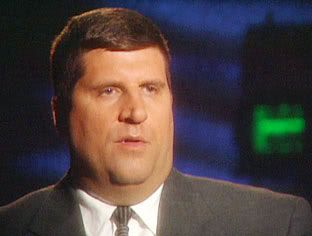
Russell D. Tice (b. 1961) is a former intelligence analyst for the U.S. Air Force, Office of Naval Intelligence, Defense Intelligence Agency (DIA) and National Security Agency (NSA). During his nearly 20 year career with various United States government agencies, he conducted intelligence missions related to the Kosovo War, Afghanistan, the USS Cole bombing in Yemen, and Operation Iraqi Freedom. In December, 2005, Tice helped spark a national controversy over claims that the NSA and the DIA were engaged in unlawful and unconstitutional wiretaps on American citizens. He later admitted that he was one of the sources that were used in the New York Times' reporting on the wiretap activity in December 2005.
Tice began to receive national attention as a whistleblower in May, 2005, after speaking publicly about alleged retaliation by government officials for reporting his suspicions that a DIA colleague might be a Chinese spy, and about the need for legislation to protect national security agency whistleblowers.
http://en.wikipedia.org/wiki/Russell_Tice
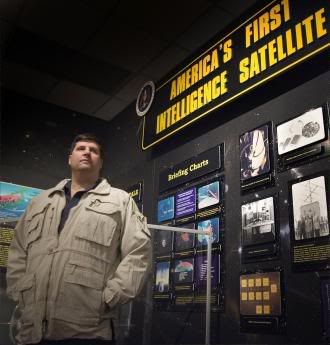
NSA Whistleblower Alleges Illegal Spying
Former Employee Admits to Being a Source for The New York Times
http://abcnews.go.com/WNT/Investigation/story?id=1491889
Russell Tice, a longtime insider at the National Security Agency, is now a whistleblower the agency would like to keep quiet.
For 20 years, Tice worked in the shadows as he helped the United States spy on other people's conversations around the world.
"I specialized in what's called special access programs," Tice said of his job. "We called them 'black world' programs and operations."
But now, Tice tells ABC News that some of those secret "black world" operations run by the NSA were operated in ways that he believes violated the law. He is prepared to tell Congress all he knows about the alleged wrongdoing in these programs run by the Defense Department and the NSA in the post-9/11 efforts to go after terrorists.
"The mentality was we need to get these guys, and we're going to do whatever it takes to get them," he said.
Tracking Calls
Tice says the technology exists to track and sort through every domestic and international phone call as they are switched through centers, such as one in New York, and to search for key words or phrases that a terrorist might use.
"If you picked the word 'jihad' out of a conversation," Tice said, "the technology exists that you focus in on that conversation, and you pull it out of the system for processing."
According to Tice, intelligence analysts use the information to develop graphs that resemble spiderwebs linking one suspect's phone number to hundreds or even thousands more.
Tice Admits Being a Source for The New York Times
President Bush has admitted that he gave orders that allowed the NSA to eavesdrop on a small number of Americans without the usual requisite warrants.
But Tice disagrees. He says the number of Americans subject to eavesdropping by the NSA could be in the millions if the full range of secret NSA programs is used.
"That would mean for most Americans that if they conducted, or you know, placed an overseas communication, more than likely they were sucked into that vacuum," Tice said.
The same day The New York Times broke the story of the NSA eavesdropping without warrants, Tice surfaced as a whistleblower in the agency. He told ABC News that he was a source for the Times' reporters. But Tice maintains that his conscience is clear.
"As far as I'm concerned, as long as I don't say anything that's classified, I'm not worried," he said. "We need to clean up the intelligence community. We've had abuses, and they need to be addressed."
The NSA revoked Tice's security clearance in May of last year based on what it called psychological concerns and later dismissed him. Tice calls that bunk and says that's the way the NSA deals with troublemakers and whistleblowers. Today the NSA said it had "no information to provide."
Who's really listening to your phone calls?
Cashing In on the NSA Database Debacle

NSA has massive database of Americans' phone calls
http://www.usatoday.com/news/washington/2006-05-10-nsa_x.htm
The National Security Agency has been secretly collecting the phone call records of tens of millions of Americans, using data provided by AT&T, Verizon and BellSouth, people with direct knowledge of the arrangement told USA TODAY.
The NSA program reaches into homes and businesses across the nation by amassing information about the calls of ordinary Americans — most of whom aren't suspected of any crime. This program does not involve the NSA listening to or recording conversations. But the spy agency is using the data to analyze calling patterns in an effort to detect terrorist activity, sources said in separate interviews.
QUESTIONS AND ANSWERS: The NSA record collection program
"It's the largest database ever assembled in the world," said one person, who, like the others who agreed to talk about the NSA's activities, declined to be identified by name or affiliation. The agency's goal is "to create a database of every call ever made" within the nation's borders, this person added.
For the customers of these companies, it means that the government has detailed records of calls they made — across town or across the country — to family members, co-workers, business contacts and others.
The three telecommunications companies are working under contract with the NSA, which launched the program in 2001 shortly after the Sept. 11 terrorist attacks, the sources said. The program is aimed at identifying and tracking suspected terrorists, they said.
The sources would talk only under a guarantee of anonymity because the NSA program is secret.
Air Force Gen. Michael Hayden, nominated Monday by President Bush to become the director of the CIA, headed the NSA from March 1999 to April 2005. In that post, Hayden would have overseen the agency's domestic call-tracking program. Hayden declined to comment about the program.
The NSA's domestic program, as described by sources, is far more expansive than what the White House has acknowledged. Last year, Bush said he had authorized the NSA to eavesdrop — without warrants — on international calls and international e-mails of people suspected of having links to terrorists when one party to the communication is in the USA. Warrants have also not been used in the NSA's efforts to create a national call database.
In defending the previously disclosed program, Bush insisted that the NSA was focused exclusively on international calls. "In other words," Bush explained, "one end of the communication must be outside the United States."
As a result, domestic call records — those of calls that originate and terminate within U.S. borders — were believed to be private.
Sources, however, say that is not the case. With access to records of billions of domestic calls, the NSA has gained a secret window into the communications habits of millions of Americans. Customers' names, street addresses and other personal information are not being handed over as part of NSA's domestic program, the sources said. But the phone numbers the NSA collects can easily be cross-checked with other databases to obtain that information.
Don Weber, a senior spokesman for the NSA, declined to discuss the agency's operations. "Given the nature of the work we do, it would be irresponsible to comment on actual or alleged operational issues; therefore, we have no information to provide," he said. "However, it is important to note that NSA takes its legal responsibilities seriously and operates within the law."
The White House would not discuss the domestic call-tracking program. "There is no domestic surveillance without court approval," said Dana Perino, deputy press secretary, referring to actual eavesdropping.
She added that all national intelligence activities undertaken by the federal government "are lawful, necessary and required for the pursuit of al-Qaeda and affiliated terrorists." All government-sponsored intelligence activities "are carefully reviewed and monitored," Perino said. She also noted that "all appropriate members of Congress have been briefed on the intelligence efforts of the United States."
The government is collecting "external" data on domestic phone calls but is not intercepting "internals," a term for the actual content of the communication, according to a U.S. intelligence official familiar with the program. This kind of data collection from phone companies is not uncommon; it's been done before, though never on this large a scale, the official said. The data are used for "social network analysis," the official said, meaning to study how terrorist networks contact each other and how they are tied together.
Carriers uniquely positioned
AT&T recently merged with SBC and kept the AT&T name. Verizon, BellSouth and AT&T are the nation's three biggest telecommunications companies; they provide local and wireless phone service to more than 200 million customers.
The three carriers control vast networks with the latest communications technologies. They provide an array of services: local and long-distance calling, wireless and high-speed broadband, including video. Their direct access to millions of homes and businesses has them uniquely positioned to help the government keep tabs on the calling habits of Americans.
Among the big telecommunications companies, only Qwest has refused to help the NSA, the sources said. According to multiple sources, Qwest declined to participate because it was uneasy about the legal implications of handing over customer information to the government without warrants.
Qwest's refusal to participate has left the NSA with a hole in its database. Based in Denver, Qwest provides local phone service to 14 million customers in 14 states in the West and Northwest. But AT&T and Verizon also provide some services — primarily long-distance and wireless — to people who live in Qwest's region. Therefore, they can provide the NSA with at least some access in that area.
Created by President Truman in 1952, during the Korean War, the NSA is charged with protecting the United States from foreign security threats. The agency was considered so secret that for years the government refused to even confirm its existence. Government insiders used to joke that NSA stood for "No Such Agency."
In 1975, a congressional investigation revealed that the NSA had been intercepting, without warrants, international communications for more than 20 years at the behest of the CIA and other agencies. The spy campaign, code-named "Shamrock," led to the Foreign Intelligence Surveillance Act (FISA), which was designed to protect Americans from illegal eavesdropping.
Enacted in 1978, FISA lays out procedures that the U.S. government must follow to conduct electronic surveillance and physical searches of people believed to be engaged in espionage or international terrorism against the United States. A special court, which has 11 members, is responsible for adjudicating requests under FISA.
Over the years, NSA code-cracking techniques have continued to improve along with technology. The agency today is considered expert in the practice of "data mining" — sifting through reams of information in search of patterns. Data mining is just one of many tools NSA analysts and mathematicians use to crack codes and track international communications.
Paul Butler, a former U.S. prosecutor who specialized in terrorism crimes, said FISA approval generally isn't necessary for government data-mining operations. "FISA does not prohibit the government from doing data mining," said Butler, now a partner with the law firm Akin Gump Strauss Hauer & Feld in Washington, D.C.
The caveat, he said, is that "personal identifiers" — such as names, Social Security numbers and street addresses — can't be included as part of the search. "That requires an additional level of probable cause," he said.
The usefulness of the NSA's domestic phone-call database as a counterterrorism tool is unclear. Also unclear is whether the database has been used for other purposes.
The NSA's domestic program raises legal questions. Historically, AT&T and the regional phone companies have required law enforcement agencies to present a court order before they would even consider turning over a customer's calling data. Part of that owed to the personality of the old Bell Telephone System, out of which those companies grew.
Ma Bell's bedrock principle — protection of the customer — guided the company for decades, said Gene Kimmelman, senior public policy director of Consumers Union. "No court order, no customer information — period. That's how it was for decades," he said.
The concern for the customer was also based on law: Under Section 222 of the Communications Act, first passed in 1934, telephone companies are prohibited from giving out information regarding their customers' calling habits: whom a person calls, how often and what routes those calls take to reach their final destination. Inbound calls, as well as wireless calls, also are covered.
The financial penalties for violating Section 222, one of many privacy reinforcements that have been added to the law over the years, can be stiff. The Federal Communications Commission, the nation's top telecommunications regulatory agency, can levy fines of up to $130,000 per day per violation, with a cap of $1.325 million per violation. The FCC has no hard definition of "violation." In practice, that means a single "violation" could cover one customer or 1 million.
In the case of the NSA's international call-tracking program, Bush signed an executive order allowing the NSA to engage in eavesdropping without a warrant. The president and his representatives have since argued that an executive order was sufficient for the agency to proceed. Some civil liberties groups, including the American Civil Liberties Union, disagree.
Companies approached
The NSA's domestic program began soon after the Sept. 11 attacks, according to the sources. Right around that time, they said, NSA representatives approached the nation's biggest telecommunications companies. The agency made an urgent pitch: National security is at risk, and we need your help to protect the country from attacks.
The agency told the companies that it wanted them to turn over their "call-detail records," a complete listing of the calling histories of their millions of customers. In addition, the NSA wanted the carriers to provide updates, which would enable the agency to keep tabs on the nation's calling habits.
The sources said the NSA made clear that it was willing to pay for the cooperation. AT&T, which at the time was headed by C. Michael Armstrong, agreed to help the NSA. So did BellSouth, headed by F. Duane Ackerman; SBC, headed by Ed Whitacre; and Verizon, headed by Ivan Seidenberg.
With that, the NSA's domestic program began in earnest.
AT&T, when asked about the program, replied with a comment prepared for USA TODAY: "We do not comment on matters of national security, except to say that we only assist law enforcement and government agencies charged with protecting national security in strict accordance with the law."
In another prepared comment, BellSouth said: "BellSouth does not provide any confidential customer information to the NSA or any governmental agency without proper legal authority."
Verizon, the USA's No. 2 telecommunications company behind AT&T, gave this statement: "We do not comment on national security matters, we act in full compliance with the law and we are committed to safeguarding our customers' privacy."
Qwest spokesman Robert Charlton said: "We can't talk about this. It's a classified situation."
In December, The New York Times revealed that Bush had authorized the NSA to wiretap, without warrants, international phone calls and e-mails that travel to or from the USA. The following month, the Electronic Frontier Foundation, a civil liberties group, filed a class-action lawsuit against AT&T. The lawsuit accuses the company of helping the NSA spy on U.S. phone customers.
Last month, U.S. Attorney General Alberto Gonzales alluded to that possibility. Appearing at a House Judiciary Committee hearing, Gonzales was asked whether he thought the White House has the legal authority to monitor domestic traffic without a warrant. Gonzales' reply: "I wouldn't rule it out." His comment marked the first time a Bush appointee publicly asserted that the White House might have that authority.
Similarities in programs
The domestic and international call-tracking programs have things in common, according to the sources. Both are being conducted without warrants and without the approval of the FISA court. The Bush administration has argued that FISA's procedures are too slow in some cases. Officials, including Gonzales, also make the case that the USA Patriot Act gives them broad authority to protect the safety of the nation's citizens.
The chairman of the Senate Intelligence Committee, Sen. Pat Roberts, R-Kan., would not confirm the existence of the program. In a statement, he said, "I can say generally, however, that our subcommittee has been fully briefed on all aspects of the Terrorist Surveillance Program. ... I remain convinced that the program authorized by the president is lawful and absolutely necessary to protect this nation from future attacks."
The chairman of the House Intelligence Committee, Rep. Pete Hoekstra, R-Mich., declined to comment.
One company differs
One major telecommunications company declined to participate in the program: Qwest.
According to sources familiar with the events, Qwest's CEO at the time, Joe Nacchio, was deeply troubled by the NSA's assertion that Qwest didn't need a court order — or approval under FISA — to proceed. Adding to the tension, Qwest was unclear about who, exactly, would have access to its customers' information and how that information might be used.
Financial implications were also a concern, the sources said. Carriers that illegally divulge calling information can be subjected to heavy fines. The NSA was asking Qwest to turn over millions of records. The fines, in the aggregate, could have been substantial.
The NSA told Qwest that other government agencies, including the FBI, CIA and DEA, also might have access to the database, the sources said. As a matter of practice, the NSA regularly shares its information — known as "product" in intelligence circles — with other intelligence groups. Even so, Qwest's lawyers were troubled by the expansiveness of the NSA request, the sources said.
The NSA, which needed Qwest's participation to completely cover the country, pushed back hard.
Trying to put pressure on Qwest, NSA representatives pointedly told Qwest that it was the lone holdout among the big telecommunications companies. It also tried appealing to Qwest's patriotic side: In one meeting, an NSA representative suggested that Qwest's refusal to contribute to the database could compromise national security, one person recalled.
In addition, the agency suggested that Qwest's foot-dragging might affect its ability to get future classified work with the government. Like other big telecommunications companies, Qwest already had classified contracts and hoped to get more.
Unable to get comfortable with what NSA was proposing, Qwest's lawyers asked NSA to take its proposal to the FISA court. According to the sources, the agency refused.
The NSA's explanation did little to satisfy Qwest's lawyers. "They told (Qwest) they didn't want to do that because FISA might not agree with them," one person recalled. For similar reasons, this person said, NSA rejected Qwest's suggestion of getting a letter of authorization from the U.S. attorney general's office. A second person confirmed this version of events.
In June 2002, Nacchio resigned amid allegations that he had misled investors about Qwest's financial health. But Qwest's legal questions about the NSA request remained.
Unable to reach agreement, Nacchio's successor, Richard Notebaert, finally pulled the plug on the NSA talks in late 2004, the sources said.
How Many Illegal Wiretapping Programs Does Bush Have?
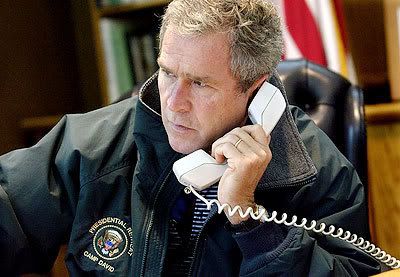
Bush says he signed NSA wiretap order
Adds he OK'd program more than 30 times, will continue to do so
http://www.cnn.com/2005/POLITICS/12/17/bush.nsa/
WASHINGTON (CNN) -- In acknowledging the message was true, President Bush took aim at the messenger Saturday, saying that a newspaper jeopardized national security by revealing that he authorized wiretaps on U.S. citizens after September 11.
After The New York Times reported, and CNN confirmed, a claim that Bush gave the National Security Agency license to eavesdrop on Americans communicating with people overseas, the president said that his actions were permissible, but that leaking the revelation to the media was illegal.
During an unusual live, on-camera version of his weekly radio address, Bush said such authorization is "fully consistent" with his "constitutional responsibilities and authorities." (Watch Bush explain why he 'authorized the National Security Agency ... to intercept' -- 4:29)
Bush added: "Yesterday the existence of this secret program was revealed in media reports, after being improperly provided to news organizations. As a result, our enemies have learned information they should not have, and the unauthorized disclosure of this effort damages our national security and puts our citizens at risk."
He acknowledged during the address that he allowed the NSA "to intercept the international communications of people with known links to al Qaeda and related terrorist organizations."
The highly classified program was crucial to national security and designed "to detect and prevent terrorist attacks," he added. (Transcript)
The NSA eavesdrops on billions of communications worldwide. Although the NSA is barred from domestic spying, it can get warrants issued with the permission of a special court called the Foreign Intelligence Surveillance Act Court.
The court is set up specifically to issue warrants allowing wiretapping on domestic soil.
'Sad day'
After hearing Bush's response, Sen. Russ Feingold, D-Wisconsin, said there was no law allowing the president's actions and that "it's a sad day."
"He's trying to claim somehow that the authorization for the Afghanistan attack after 9/11 permitted this, and that's just absurd," Feingold said. "There's not a single senator or member of Congress who thought we were authorizing wiretaps."
He added that the law clearly lays out how to obtain permission for wiretaps.
"If he needs a wiretap, the authority is already there -- the Federal Intelligence Surveillance Act," Feingold said. "They can ask for a warrant to do that, and even if there's an emergency situation, they can go for 72 hours as long as they give notice at the end of 72 hours."
Bush defended signing the order by saying that two of the September 11 hijackers who flew the plane into the Pentagon -- Khalid Almihdhar and Nawaf Alhazmi -- "communicated while they were in the United States to other members of al Qaeda who were overseas, but we didn't know they were here until it was too late."
He said the authorizations have made it "more likely that killers like these 9/11 hijackers will be identified and located in time, and the activities conducted under this authorization have helped detect and prevent possible terrorist attacks in the United States and abroad."
Re-authorized 30 times
Sources with knowledge of the program told CNN on Friday that Bush signed the secret order in 2002. The sources refused to be identified because the program is classified.
Bush, however, said he authorized the program on several occasions since the September 11 attacks and that he plans on doing it again.
"I have re-authorized this program more than 30 times," he said. "I intend to do so for as long as our nation faces a continuing threat from al Qaeda and related groups."
The New York Times had not responded to Bush's allegations that the paper endangered national security as of Saturday afternoon.
But in a Friday statement, Executive Editor Bill Keller said the newspaper postponed publication of the article for a year at the White House's request, while editors pondered the national security issues surrounding the release of the information.
But after considering the legal and civil liberties aspects, and determining that the story could be written without jeopardizing intelligence operations, the paper ran the story, Keller said, emphasizing that information about many NSA eavesdropping operations is public record.
CNN has not confirmed the exact wording of the president's order.
The political ramifications of the newspaper's report were felt even before Bush acknowledged the report's veracity.
Senators contemplating a vote Friday on whether to renew some controversial portions of the Patriot Act used The New York Times' report as evidence that the government could not be trusted with the broad powers laid out in the act. (Read about the Patriot Act vote)
In particular, Sen. Arlen Specter, R-Pennsylvania, said such behavior by the executive branch "can't be condoned," and Sen. Charles Schumer, D-New York, said the report swayed his decision on the Patriot Act proposal.
"Today's revelation that the government listened in on thousands of phone conversations without getting a warrant is shocking and has greatly influenced my vote," Schumer said. "Today's revelation makes it very clear that we have to be very careful -- very careful."
Specter, the chairman of the Senate Judiciary Committee, added Friday that his committee would immediately begin investigating the matter.
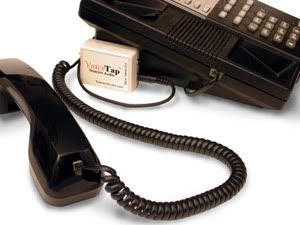
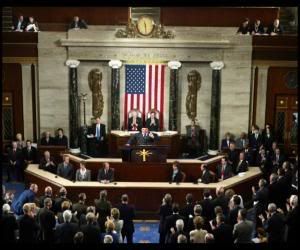
Congress considers changes to wiretap law
Revision would make it easier to eavesdrop on foreign exchanges
http://deseretnews.com/dn/view/0,1249,695197047,00.html
WASHINGTON — The chairman of the Senate Select Committee on Intelligence on Wednesday proposed changes in the foreign intelligence wiretap law that would make it easier for U.S. spy agencies to eavesdrop on phone and e-mail conversations between foreigners outside the United States.
But Sen. Jay Rockefeller, D-W.Va., rejected a proposal from Director of National Intelligence Mike McConnell to give the attorney general — currently the controversial Alberto Gonzales — the power to authorize foreign intelligence collection without going through a secret foreign intelligence court.
The developments pitted Republican efforts to strengthen executive power in the name of fighting the war on terrorism against Democratic efforts to balance that goal with protecting the civil liberties of American citizens and residents.
Rockefeller's proposed changes to the Foreign Intelligence Surveillance Act (FISA) were being negotiated with the White House late Wednesday. Rockefeller and Senate leaders of both parties said they hoped an agreement could be worked out so that the measure could be voted on this week, before Congress takes an August recess.
The Democrats' proposed changes were a response to assertions by congressional Republicans that U.S. intelligence agencies are missing important information because FISA is too restrictive. McConnell said in a letter last Friday that change was urgently needed "to close critical gaps in the intelligence community's ability to provide warning of threats to the country."
Rockefeller said the Bush administration's proposal went too far.
"The administration has offered a proposal that would instead permanently grant the attorney general excessive surveillance powers by giving him sole authority to direct surveillance while completely removing the FISA court from the process. That is simply unacceptable," he said in a statement.
"The FISA court must continue to play an essential role in authorizing surveillance and overseeing its execution."
Rockefeller said his proposal would underscore that FISA doesn't apply to foreign-to-foreign intelligence collection. The secret FISA court, however, has an oversight role when foreign surveillance involves a person in the United States, and warrants are then required.
The Democrats' proposals that Rockefeller outlined would require the FISA court to examine the procedures that intelligence agencies use to determine whether a surveillance target was a foreigner. The court would have to endorse those procedures before the agencies could listen in without warrants.
Rockefeller proposed that the changes remain in effect only six months. In the meantime, Congress would consider long-term changes to FISA.
"Earlier this year, the Senate Intelligence Committee began work on the issue of modernizing FISA with the overarching goal of improving foreign intelligence collection, protecting civil liberties and preventing this or any future president from ever abusing surveillance laws again," Rockefeller said. But the committee was hampered when the administration refused to provide key documents about the warrantless surveillance program, he said.
The National Security Agency ran a warrantless surveillance program in secret from 2001 until late 2005, when it was disclosed.
The administration announced in January that the program would be placed under the supervision of the FISA court, which would have to approve surveillance warrant requests.
Rep. Heather Wilson of New Mexico, the ranking Republican on the House Subcommittee on Technical and Tactical Intelligence, has called for changing the law to allow American intelligence agencies to listen to foreigners overseas without warrants. "American lives have been imperiled," she warned.
Wilson's office said that last week McConnell wrote to the House Intelligence Committee and quoted his letter in part: "We are significantly burdened in capturing overseas communications of foreign terrorists planning to conduct attacks inside the United States."
McConnell added that "in a significant number of cases, we are in the unfortunate position of having to obtain court orders to effectively collect foreign intelligence about foreign targets located overseas."
Michelle Richardson, a legislative consultant for the American Civil Liberties Union, said Congress shouldn't rush the changes. The civil liberties group was concerned that Rockefeller's plan to allow for court orders covering procedures for foreign collection would in many cases allow surveillance where one party was in the United States.
"It's not individualized, which is what's so scary about this," she said. "You are inevitably going to suck up innocent people — their calls and e-mails."
Sen. Russ Feingold, D-Wis., said the bill should have a 90-day sunset period so that any problems could be fixed faster.
"We need to wiretap terrorists, and we should address the problem that has been identified with FISA with respect to foreign-to-foreign communications," Feingold said. "But the administration's overly broad proposal goes far beyond that and would leave critical decisions related to surveillance involving Americans entirely up to the attorney general. The proposal from the Democratic leadership is better and involves FISA court review from the start. But it does not have adequate safeguards to protect Americans' privacy."
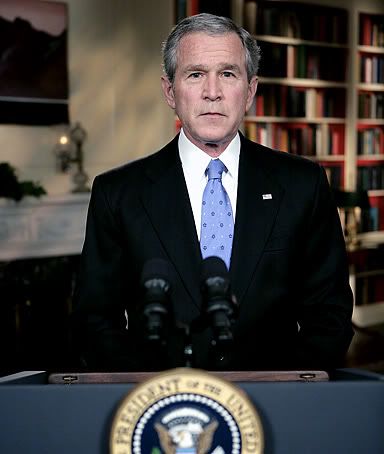
Bush urges Congress to pass wiretap bill
http://www.boston.com/news/nation/washington/articles/2007/08/03/bush_urges_congress_to_pass_wiretap_bill/
Lawmakers hustle to act before recess.
WASHINGTON -- Congress is rushing to expand the military's authority to wiretap phone calls and e-mails on US soil. The Bush administration, warning that terrorists may soon attack again, is pressuring lawmakers to approve the legislation before they leave town this weekend for their annual August vacations.
Article Tools
The proposal, the details of which remain murky, had received little public discussion before this week and has not undergone the normal committee review process. It would apparently give the National Security Agency legal approval to resume one type of the warrantless wiretapping that President Bush authorized after the terrorist attacks of Sept. 11, 2001.
The White House says the legislation is necessary to give the spy agency the ability to eavesdrop on suspected terrorists without court-approved warrants. Leaders in the Democratic-controlled Congress say they are willing to pass a version of the bill, and have spent the week in closed-door negotiations on the details.
But civil liberties groups urged Congress to slow down. Democrats have said the anticipated legislation will expire in several months, but the American Civil Liberties Union warned that such laws often end up on the books permanently.
"Our message to Congress is 'Do not rush into this, or you may later find that you regret it the way many members regret the Patriot Act,' " said Tim Sparapani of the ACLU, referring to the bill Congress hurriedly passed the month after 9/11 and made permanent in March 2006.
Lawmakers and administration officials have said little about what the bill would accomplish because it involves classified surveillance technology. A draft of the Democrats' legislation had not yet been released yesterday, and a rival Republican bill, introduced Wednesday, is vaguely worded.
Still, a sketch of the legislation has begun to emerge from fragments of information in media reports and analyses of the Republican bill by legal specialists.
The focus appears to be the NSA's ability to monitor certain calls and e-mails routed through telecommunications switches located on US soil. The agency wants to be able to eavesdrop on overseas-based calls and e-mails passing through those switches without court oversight.
A 1978 law requires the NSA to obtain a warrant from a secret national security court when it listens to calls on US soil. The law was written before changes in technology led some foreign calls to go through American switches.
One proposed change would make clear that the NSA does not need a warrant to intercept foreign soil-to-foreign soil communications, even if it does so by tapping into a device on US soil. But the more controversial change apparently focuses on whether the agency needs a warrant to spy on an overseas target who communicates with people whose location is unknown -- and sometimes turn out to be Americans
"From what I can tell, the legal issue is how [the warrant law] applies when . . . the government has no idea where the people are on the other end of that [overseas] person's calls and e-mails, but they want to monitor from the US switch," Orin Kerr, a law professor and former Justice Department official, wrote on a legal blog yesterday.
Analysts said the Bush administration apparently wants Congress to change the law to allow the NSA to eavesdrop on such communications without warrants, as long as its primary target is overseas. One part of the negotiations between the White House and Congress concerns who should audit the NSA to make sure it does not abuse that authority. The Bush administration has proposed that Attorney General Alberto R. Gonzales oversee the program, but Democrats want to give such authority to the national security court.
The dispute dates to the weeks after the 2001 terrorist attacks, when Bush secretly authorized the NSA to tap into Americans' international phone calls and e-mails without warrants. Such warrantless wiretapping was prohibited by the 1978 surveillance law, but Bush said he had the wartime power to bypass the statute.
The warrantless wiretapping program came to light in December 2005, prompting a long-running debate over the rule of law and the limits of presidential power during wartime. The administration insisted it had acted legally, but in January, Gonzales announced that the warrantless wiretapping program had ended with an agreement between the administration and a judge on the national security court.
The judge issued a classified order that allowed the NSA's surveillance to continue under the court's oversight. But several months later, another judge on the court decided that the order was illegal. That months-old ruling, which prompted the current debate, was disclosed this week by House minority leader John Boehner during an interview on Fox News.
The administration has not explained why it asked Congress to change the statute instead of reviving the warrantless surveillance program it conducted from 2001 to 2006. Asked whether the administration no longer believed its theory about presidential power, a Justice Department spokesman said, "Given all the ongoing negotiations over these [Foreign Intelligence Surveillance Act] matters right now, we're going to decline comment."
Yesterday, three senators -- Russ Feingold, Democrat of Wisconsin, Robert Byrd, Democrat of West Virginia, and Bernie Sanders, Independent of Vermont -- asked the Senate majority leader, Harry Reid, Democrat of Nevada, to underscore in the coming legislation that it is illegal to bypass the surveillance statute's procedures.
"We are reluctant to amend [the law] without assurances that the administration will actually follow the law," they wrote.
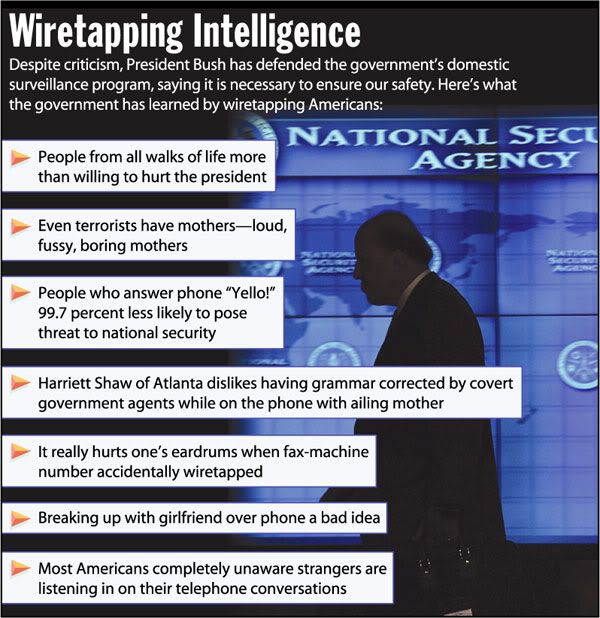
Pressure on Democrats to expand wiretap power
http://www.wilmingtonstar.com/article/20070801/NEWS/708010450/-1/State
Washington | Under pressure from President Bush, Democratic leaders in Congress are scrambling to pass legislation this week to expand the government's electronic wiretapping powers.
Democratic leaders have expressed a new willingness to work with the White House to amend what both sides agree is a problem in the current law, according to congressional aides. The administration says the National Security Agency is now required to seek court approval before eavesdropping on some purely foreign telephone calls and e-mail.
Both Democratic leaders and the White House have agreed that the law, the Foreign Intelligence Surveillance Act, should be changed to make it easier to monitor such communications.
In the past few days, Bush and Mike McConnell, director of National Intelligence, have publicly called on Congress to make the change before its August recess, which could begin this weekend. Democratic leaders say they are working with the administration to try to forge a bill that could quickly pass both houses. It would be the first change in the law since the Bush administration's warrantless wiretapping program became public in December 2005.
Democrats appear worried that if they block such legislation, they will be depicted by the White House as being weak on terrorism.
"We hope our Republican counterparts will work together with us to fix the problem, rather than try again to gain partisan political advantage at the expense of our national security," Senate Majority Leader Harry Reid of Nevada said Monday night.
Some civil liberties groups oppose the proposed changes, expressing concern that there might be far-reaching consequences.
"Congress needs to take its time before it implements another piece of anti-terrorism legislation it will regret, like the Patriot Act," said Anthony D. Romero, executive director of the American Civil Liberties Union. "The Bush administration clearly has abused the FISA powers it already has and clearly wants to go back to the good old days of warrantless wiretapping and domestic spying. Congress must stop this bill in its tracks."
The administration says digital technology and the globalization of the telecommunications industry have created a legal quandary for the intelligence community. Some purely international telephone calls now are routed through telephone switches inside the United States, which means such "transit traffic" can be subject to federal surveillance laws requiring search warrants for any government eavesdropping.
Under the warrantless wiretapping program, which began soon after the Sept. 11 attacks, the NSA eavesdropped on the transit traffic without seeking court approval. But in January, the Bush administration placed the program back under the FISA law, which meant search warrants were required for surveillance of the transit traffic.
Until recently, Democrats in Congress were reluctant to agree to changing the law, which was proposed by the White House in April.
Democratic leaders said they did not want to amend it until the administration provided more information about how the NSA had secretly skirted the law with its warrantless wiretapping program. Now they back a narrow FISA bill.
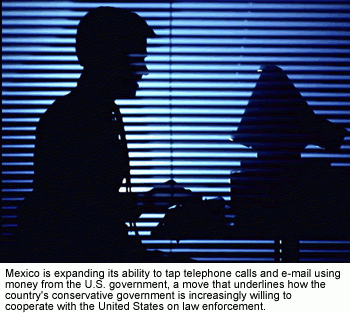
Mexico to Boost Tapping of Phones and e-Mail with US Aid
http://www.commondreams.org/archive/2007/05/25/1450/
MEXICO CITY - Mexico is expanding its ability to tap telephone calls and e-mail using money from the U.S. government, a move that underlines how the country’s conservative government is increasingly willing to cooperate with the United States on law enforcement.
The expansion comes as President Felipe Calderon is pushing to amend the Mexican Constitution to allow officials to tap phones without a judge’s approval in some cases. Calderon argues that the government needs the authority to combat drug gangs, which have killed hundreds of people this year.
Mexican authorities for years have been able to wiretap most telephone conversations and tap into e-mail, but the new $3-million Communications Intercept System being installed by Mexico’s Federal Investigative Agency will expand their reach.
The system will allow authorities to track cellphone users as they travel, according to contract specifications. It includes extensive storage capacity and will allow authorities to identify callers by voice. The system, scheduled to begin operation this month, was paid for by the U.S. State Department and sold by Verint Systems Inc., a politically well-connected firm based in Melville, N.Y., that specializes in electronic surveillance.
Although information about the system is publicly available, the matter has drawn little attention so far in the United States or Mexico. The modernization program is described in U.S. government documents, including the contract specifications, reviewed by The Times.
They suggest that Washington could have access to information derived from the surveillance. Officials of both governments declined to comment on that possibility.
“It is a government of Mexico operation funded by the U.S.,” said Susan Pittman, of the State Department’s Bureau of International Narcotics and Law Enforcement Affairs. Queries should be directed to the Mexican government, she said.
Calderon’s office declined to comment.
But the contract specifications say the system is designed to allow both governments to “disseminate timely and accurate, actionable information to each country’s respective federal, state, local, private and international partners.”
Calderon has been lobbying for more authority to use electronic surveillance against drug violence, which has threatened his ability to govern. Despite federal troops posted in nine Mexican states, the violence continues as rival smugglers fight over shipping routes to the U.S.-Mexico border, as well as for control of Mexican port cities and inland marijuana and poppy growing regions.
Nonetheless, the prospect of U.S. involvement in surveillance could be extremely sensitive in Mexico, where the United States historically has been viewed by many as a bullying and intrusive neighbor. U.S. government agents working in Mexico maintain a low profile to spare their government hosts any political fallout.
It’s unclear how broad a net the new surveillance system will cast: Mexicans speak regularly by phone, for example, with millions of relatives living in the U.S. Those conversations appear to be fair game for both governments.
Legal experts say that prosecutors with access to Mexican wiretaps could use the information in U.S. courts. U.S. Supreme Court decisions have held that 4th Amendment protections against illegal wiretaps do not apply outside the United States, particularly if the surveillance is conducted by another country, Georgetown University law professor David Cole said.
Mexico’s telecommunications monopoly, Telmex, controlled by Carlos Slim Helu, the world’s second-wealthiest individual, has not received official notice of the new system, which will intercept its electronic signals, a spokeswoman said this week.
“Telmex is a firm that always complies with laws and rules set by the Mexican government,” she said.
Calderon recently asked Mexico’s Congress to amend the country’s constitution and allow federal prosecutors free rein to conduct searches and secretly record conversations among people suspected of what the government defines as serious crimes.
His proposal would eliminate the current legal requirement that prosecutors gain approval from a judge before installing any wiretap, the vetting process that will for now govern use of the new system’s intercepts. Calderon says the legal changes are needed to turn the tide in the battle against the drug gangs.
“The purpose is to create swift investigative measures against organized crime,” Calderon wrote senators when introducing his proposed constitutional amendments in March. “At times, turning to judicial authorities hinders or makes investigations impossible.”
But others argued that the proposed changes would undermine constitutional protections and open the door to the type of domestic spying that has plagued many Latin American countries. Colombian President Alvaro Uribe last week ousted a dozen generals, including the head of intelligence, after police were found to be wiretapping public figures, including members of his government.
“Calderon’s proposal is limited to ‘urgent cases’ and organized crime, but the problem is that when the judiciary has been put out of the loop, the attorney general can basically decide these however he wants to,” said John Ackerman, a law professor at the National Autonomous University of Mexico. “Without the intervention of a judge, the door swings wide open to widespread abuse of basic civil liberties.”
The proposal is being considered by a panel of the Mexican Senate. It is strongly opposed by members of the leftist Democratic Revolution Party. Members of Calderon’s National Action Party have been lobbying senators from the former ruling party, the Institutional Revolutionary Party, for support.
Renato Sales, a former deputy prosecutor for Mexico City, said Calderon’s desire to expand federal policing powers to combat organized crime was parallel to the Bush administration’s use of a secret wiretapping program to fight terrorism.
“Suddenly anyone suspected of organized crime is presumed guilty and treated as someone without any constitutional rights,” said Sales, now a law professor at the Autonomous Technological Institute of Mexico. “And who will determine who is an organized crime suspect? The state will.”
Federal lawmaker Cesar Octavio Camacho, president of the justice and human rights commission in the lower house of Congress, said he too worried about prosecutorial abuse.
“Although the proposal stems from the president’s noble intention of efficiently fighting organized crime,” he said, “the remedy seems worse than the problem.”
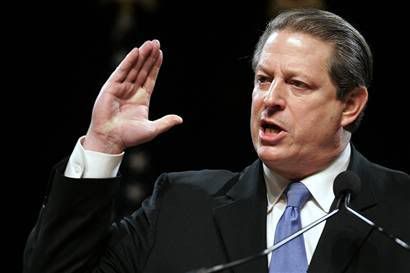
Gore Says Bush Wiretapping Could Be Impeachable Offense
Former Vice President Says Legislators From Both Parties Did Not Do Enough to Stop Secret Activities
http://abcnews.go.com/US/story?id=1511599
In an impassioned speech about President Bush's warrantless domestic wiretapping program, former Vice President Al Gore said in Washington, D.C., on Monday that "the president of the United States has been breaking the law repeatedly and persistently."
Citing the Bush administration's policies on torture, rendition and detentions, the winner of the 2000 popular vote said the president's "unlawful" eavesdropping program was part of a "larger pattern" of "seeming indifference to the Constitution."
Asked by ABC News after his speech whether President Bush's domestic spying program constituted an impeachable offense, Gore said it might and pointed to one of the three Articles of Impeachment that the House Judiciary Committee approved against President Nixon on July 27, 1974.
"That's a legal determination for Congress to make," Gore told ABC News. "But Article II of the impeachment charges against President Nixon was warrantless wiretapping, which the president said was 'necessary' for national security."
It can be an impeachable offense, Gore added.
The domestic eavesdropping program authorized by President Bush following the attacks of Sept. 11, 2001, bypasses a special federal court whose approval is required under the Foreign Intelligence Surveillance Act. Ever since the New York Times revealed the secret program last month, the Bush administration has claimed that the circumvention of the FISA court was justified by arguing, in part, that Congress implicitly authorized the surveillance with the post-9/11 authorization to use military force.
Gore's speech drew fire from the president's party on Monday. Tracey Schmitt, a spokeswoman for the Republican National Committee, issued a statement criticizing the former vice president, stating Gore has an "incessant need to insert himself in the headline of the day" and has a "lack of understanding of the threats facing America."
White House Press Secretary Scott McClellan added to the criticism at his press briefing on Tuesday afternoon. "Al Gore's hypocrisy knows no bounds. If he is going to be the voice of the Democratic Party on national security matters, we welcome it," said McClellan.
The former vice president refused to back down and reiterated his call for a special counsel to independently review the administration's actions surrounding the National Security Agency's domestic warrantless wiretapping program.
"It is clearly wrong and disrespectful to the American people to allow a close political associate of the president to be in charge of reviewing serious charges against him," said Gore.
But Gore is not the only one arguing that the warrantless eavesdropping authorized by President Bush conflicts with existing law and hinges on weak legal arguments. The nonpartisan Congressional Research Service reached a similar conclusion earlier this month in a 41-page legal analysis.
While appearing on "This Week with George Stephanopoulos" on Sunday, Senate Judiciary Committee Chairman Arlen Specter, R-Penn., said he, too, did not agree with the White House view that Congress effectively authorized the surveillance with its post-9/11 resolution.
A Bipartisan Problem
Specter and Gore part company, though, on the question of whether a president might possess special inherent powers as commander-in-chief that would make the National Security Agency's domestic spying program permissible in wartime. Whereas Gore is confident that the president does not possess such power, Specter is hoping to explore the issue when the Senate Judiciary Committee holds hearings on the legality of the president's program next month.
In his Constitution Hall remarks on Monday, Gore did not confine his criticism to members of the other party. He criticized both Republican and Democratic members of the so-called "Gang of Eight," who were secretly briefed on the NSA program but did not take action to stop the president's "illegal activities."
"Though I sympathize with the awkward position in which these men and women were placed, I cannot disagree with the Liberty Coalition when it says that Democrats as well as Republicans in the Congress must share the blame for not taking action to protest and seek to prevent what they consider a grossly unconstitutional program," Gore said.
The Liberty Coalition is the "trans-partisan" civil liberties group that co-sponsored Gore's speech, along with the American Constitution Society.
Supreme Court Criticism
In his Martin Luther King Day remarks, Gore also criticized President Bush for nominating Supreme Court justices who he believes will not serve as an adequate check on the executive.
"Whether you support his confirmation or not -- and I do not -- we must all agree that he will not vote as an effective check on the expansion of executive power," Gore said with respect to Judge Samuel Alito. "Likewise, Chief Justice Roberts has made plain his deference to the expansion of executive power through his support of judicial deference to executive agency rulemaking."
Regarding specific recommendations, Gore called upon congressional candidates to appoint a special counsel to investigate domestic eavesdropping, which could become an issue in the 2006 elections.
He also appealed for new whistleblower protections, comprehensive hearings in the House and Senate and no renewal of the Patriot Act until adequate constitutional safeguards are added. He also wants telecommunications companies to "cease and desist" their "complicity" in this "apparently illegal invasion of the privacy of American citizens."
Gore's biggest standing ovation came when he said it was "simply an insult" to those who "came before us" to "imply that we have more to be fearful of than they."
In an effort to show that criticism of President Bush's spying program reaches across party lines, Gore was supposed to be introduced by former Rep. Bob Barr (R-Ga.), a former House manager in the impeachment trial of then-President Bill Clinton. Since leaving Congress in 2003, Barr has emerged as an outspoken critic of the effect the Bush administration's antiterror policies have on civil liberties.
The image of the odd bedfellows did not materialize, however, as Barr's satellite connection failed.
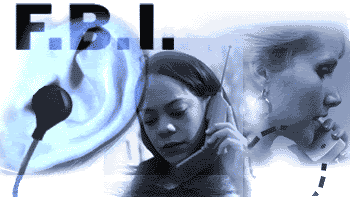
Mixed Signals on Wiretapping
Americans divide down the middle when asked about recent news reports that the National Security Agency has been wiretapping international calls and e-mails involving terrorism suspects in the United States without first getting court approval. But the even split masks partisan differences.
http://www.washingtonpost.com/wp-dyn/content/graphic/2006/01/11/GR2006011100103.html
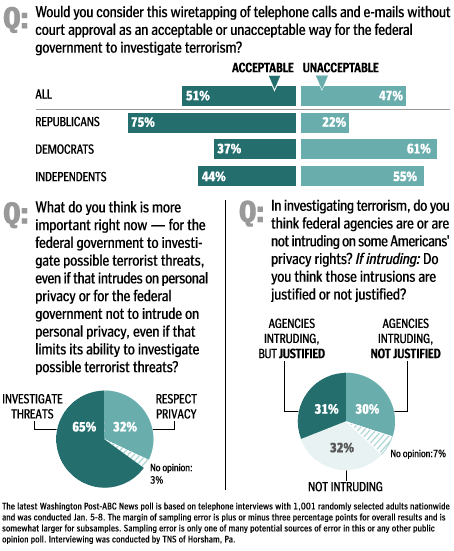

Gone-zales warrantless wiretapping scandal
CNN: Excerpts from the Gonzales Hearing on wire tapping
Gonzalez Doesn't Deny Driftnet Surveillance on US Citizens
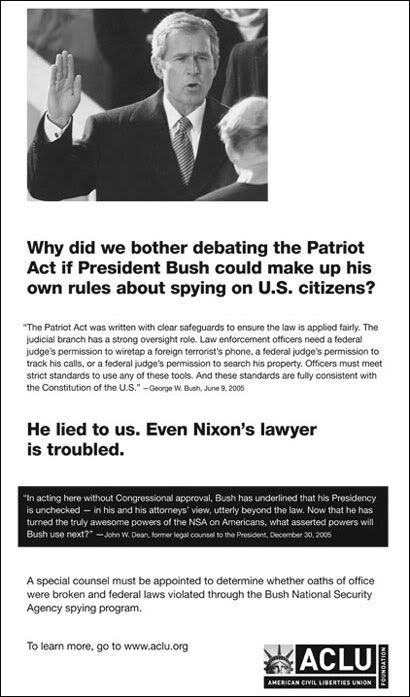
Wire Tap
NSA Internet spying
have you no sense of decency sir
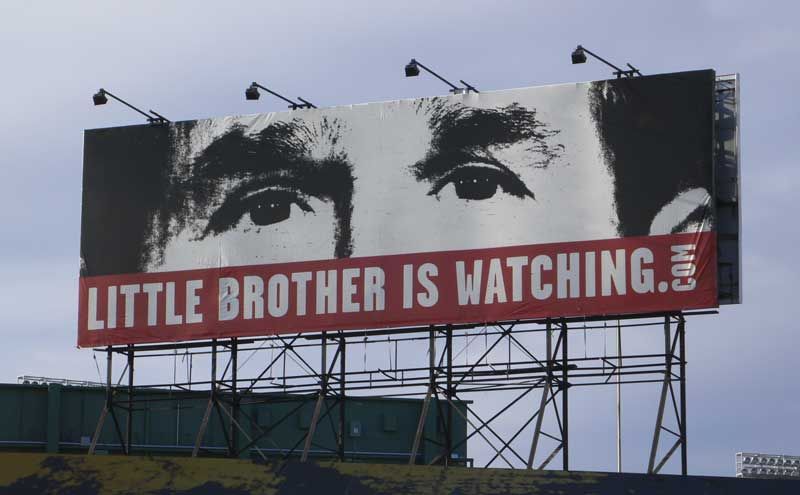
911 Truth: Chilling the 1st Amendment
Ashcroft pressured to Authorize Warrantless Wiretaps
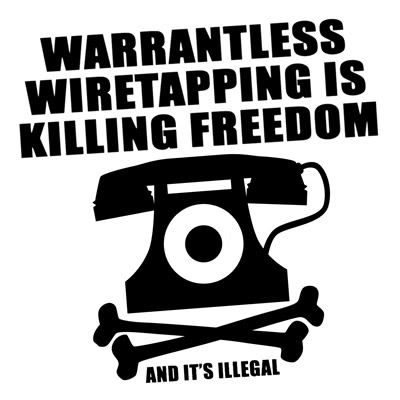
Wiretaps Spec
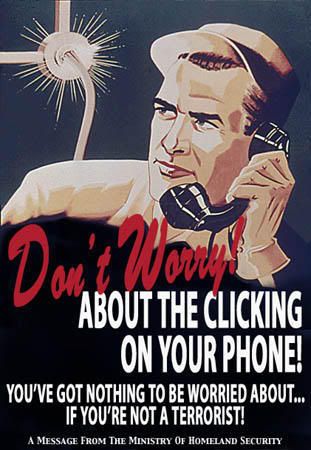
Spy Watch













![Brotherhood" (2006) [TV-Series]](http://photos1.blogger.com/x/blogger2/1421/379621144723082/211/z/425926/gse_multipart33129.jpg)







No comments:
Post a Comment